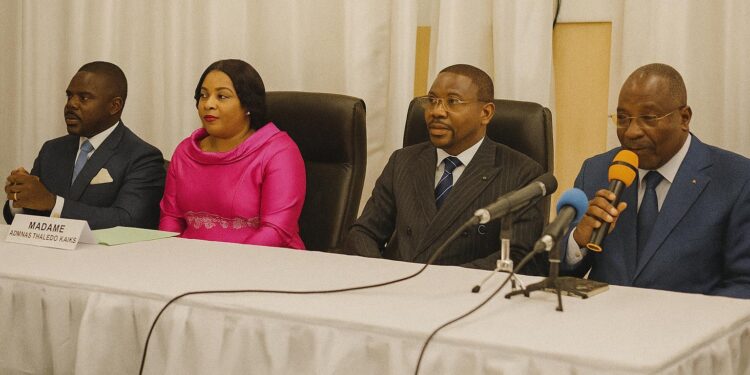Historic Appointment Signals Gender Progress
The July installation of Grace Steph Antonétie Ivosso as the inaugural woman to lead Ouenzé’s municipal council resonates far beyond Brazzaville’s fifth arrondissement. Observers in diplomatic circles quickly framed the development as another indication that the Republic of Congo’s modernisation trajectory includes a deliberate opening of civic space for female leadership. The Ministry of the Interior confirms that women now head three of Brazzaville’s nine districts, an evolution the government describes as consonant with President Denis Sassou Nguesso’s 2022–2026 National Development Plan, which emphasises inclusive growth (Ministry of Planning communiqué, May 2023).
By accepting the mayoral sash, Ivosso—formerly an economic attaché at the Interior Ministry and secretary-general of Mfilou-Ngamaba—joins a small cadre of women whose careers bridge central administration and local execution. Domestic commentators, including the Centre d’Analyse et de Prospective des Politiques Publiques, underline that such profiles are increasingly prized for their ability to translate national policy into neighbourhood-scale results without political friction.
Local Governance within National Vision
The Ouenzé ceremony, presided over by Minister Juste Désiré Mondélé, was deliberately choreographed to reinforce cohesion between municipal actors and central authorities. In his address, the minister reminded dignitaries that decentralisation remains a pillar of Congo-Brazzaville’s stability compact, designed to deliver public services efficiently while maintaining a single political rhythm across the republic. Analysts at the Brazzaville-based think-tank Institut Galaxie note that the administration’s gradual devolution of competencies—sanitation, minor infrastructure, civil documentation—has so far avoided the fragmentation witnessed in some neighbouring states.
Parliamentarians Romy Oyo and Daniel Iloye Gouya echoed the call for concerted action, framing Ouenzé as a microcosm where the credibility of broader reforms will either be consolidated or questioned. Their intervention aligns with National Assembly debates emphasising performance metrics for local executives, including revenue mobilisation and participatory budgeting.
Stakeholder Expectations and Early Priorities
In her first public remarks, Mayor Ivosso pledged to forge a ‘compact of harmony’ with community leaders, promising that neither ethnicity nor partisan affiliation would colour the allocation of municipal resources. Practitioners of urban governance highlight that Ouenzé, with an estimated 220 000 inhabitants, wrestles with classic capital-city pressures: informal settlements, youth unemployment, solid-waste management and small-business formalisation. The new mayor inherits a cadre of 56 municipal officials and 80 deconcentrated state agents specialising in youth affairs, culture, sanitation and cadastral services—an administrative mosaic whose alignment will be her earliest managerial test.
Local NGOs, such as Association des Jeunes de la Tsiémé, have already submitted memoranda urging the mayor to prioritise drainage rehabilitation ahead of the rainy season. In parallel, the Chamber of Commerce advocates streamlined licensing for street vendors, arguing that a predictable regulatory environment would mitigate petty corruption while broadening the tax base.
Regional Diplomacy and Development Synergies
Ouenzé’s evolution occurs at a time when Brazzaville is positioning itself as an interlocutor for cross-border urban solutions along the Congo River corridor. The Central African Economic and Monetary Community (CEMAC) recently adopted guidelines encouraging municipalities to pool expertise on waste-to-energy schemes; Mayor Ivosso has signalled receptiveness to such cooperative ventures. A senior adviser at the Ministry of Foreign Affairs, speaking under the Chatham House Rule, suggested that ‘municipal diplomacy’ could become a soft-power asset for the republic, enhancing its standing in continental climate forums while stressing domestic capability.
International partners have taken note. The French Development Agency confirmed exploratory discussions over technical assistance grants aimed at upgrading Ouenzé’s markets and digital tax administration. These engagements complement China’s on-going rehabilitation of primary roads through the National Urban Programme, a synergy officials describe as non-exclusive and functional.
Prospects for Inclusive Municipal Management
Seasoned observers caution that symbolic breakthroughs, while significant, do not automatically translate into systemic transformation. Sustainable progress, they argue, will hinge on the mayor’s ability to institutionalise gender-responsive budgeting, professionalise human resources and cultivate citizen oversight mechanisms already piloted in Djiri and Poto-Poto. Yet optimism persists: the United Nations Development Programme’s 2023 governance report ranked Congo-Brazzaville in the regional top tier for women’s participation in local assemblies, citing legislative quotas and consistent executive advocacy.
Should Mayor Ivosso succeed in embedding consultative practices and transparent procurement, Ouenzé could emerge as a reference point for decentralised governance across Central Africa. For now, the district’s bustling avenues and iconic Matonge roundabout serve as daily reminders that political pledges must quickly translate into visible service improvements. The stakes are high, but so too is the reservoir of goodwill generated by a community’s unanimous welcome for its first woman at the helm.











































